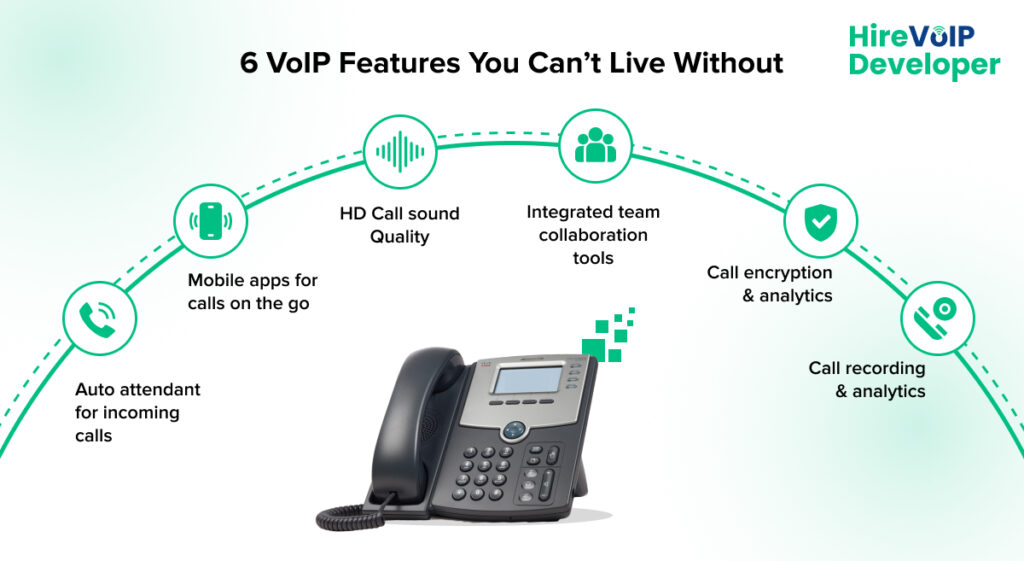| Quick Summary – Is your business communication stuck between what and why? Tap to learn eight amazing VoIP perks that can simplify enterprise communication and help your business thrive! |
Communication – connecting the dots from one to another.
Communication – connecting your business globally.
But you can do more with it. Why, What, and How? Let’s understand, one by one.
Why?
Effective communication is the backbone of any business landscape. As businesses globalize, remote work trends and customer expectations increase, the need for robust communication solutions has become more urgent than ever. Traditional phone systems are okay, but they cannot keep up with the demands of modern enterprises.
This is where Enterprise VoIP solutions come into the picture. VoIP has transformed how businesses communicate, offering cost-efficiency, scalability, and advanced features that cater to today’s dynamic work environments. If your company hasn’t adopted VoIP yet, you must switch now.
What?
1. How Does VoIP Help Enterprises Cut Costs?
One of the most significant advantages of enterprise VoIP solutions is the potential for cost reduction. Traditional phone systems come with heavy installation fees, maintenance costs, and high long-distance or international call charges. VoIP eliminates these expenses by using the internet to transmit voice data, significantly reducing call costs.
Moreover, many top enterprise VoIP providers offer flexible pricing models, allowing businesses to choose plans tailored to their needs. With VoIP, there are no hidden fees or expensive hardware requirements; all you need is a stable internet connection. VoIP is ideal for businesses looking to cut operational costs without compromising quality.
2. Is VoIP a Scalable Solution for Enterprises and Businesses?
As your business expands, so do its communication needs. Traditional phone systems often struggle to keep up with growth, requiring new hardware installations and extensive setup processes. VoIP, however, is inherently scalable. Adding new lines or users is as simple as updating your subscription plan, allowing your communication system to grow alongside your business.
This scalability is especially beneficial for organizations with multiple locations or remote teams. A unified VoIP system ensures seamless connectivity across all branches, enabling employees to communicate efficiently regardless of location.
3. How does VoIP Help in Connecting Teams and improve Team Collaboration?
Effective teamwork requires seamless communication and VoIP solutions for enterprises to foster collaboration. VoIP integrates multiple business communication tools into a single platform, unlike traditional phone systems. Features like video conferencing, instant messaging, and file sharing enable employees to work together in real time, even if they’re spread across different locations.
With VoIP, teams can hold virtual meetings, share important documents, and stay connected without relying on separate software or tools. This unified approach streamlines workflows, reduces misunderstandings, and boosts overall productivity.
4. Do VoIP Solutions Support Remote Work?
The rise of remote work has made mobility a critical factor for modern communication systems. VoIP provides employees with the flexibility to stay connected from anywhere. With mobile apps and virtual phone numbers, employees can make and receive calls using their work number on a smartphone, tablet, or laptop.
This mobility ensures that your workforce remains productive and accessible, whether working from home, traveling, or at a client site. Features like voicemail-to-email and call forwarding further enhance flexibility, allowing employees to stay organized and responsive.
Upgrade to Smarter Communication for Your Business! 📞
5. How does VoIP help Enterprises Enhance Customer Experience?
Customer satisfaction is at the heart of every successful business. VoIP solutions help businesses deliver exceptional customer service by ensuring that calls are answered promptly and directed to the right person or department. Features like IVR systems and automated call distribution minimize wait times and improve first-call resolution rates.
VoIP for businesses allows them to connect their phone system with Customer Relationship Management (CRM) tools. This enables employees to access customer information during calls, providing personalized service that fosters loyalty and satisfaction.
6. Can VoIP be Integrated with Existing Enterprise Communication Tools?
Modern businesses rely on various business communication tools and software to manage operations. VoIP systems integrate seamlessly with popular applications like CRMs, project management tools, and email platforms. This integration enables a smoother workflow by consolidating communication and operational data in one place.
For example, when a customer calls, your VoIP system can automatically pull up their information from your CRM, equipping employees with the context they need to address queries efficiently. Such integrations save time, reduce manual effort, and enhance the overall quality of interactions.
7. Is VoIP a Reliable and Secure Solutions for Enterprises?
Concerns about reliability and security often deter businesses from adopting new technologies. However, VoIP for business systems are designed to address these issues effectively. Modern VoIP solutions for enterprises leverage cloud-based infrastructure, ensuring high uptime and reliable service. Even during a power outage or network disruption, features like call rerouting and failover systems keep communication running smoothly.
For security in VoIP, providers employ advanced encryption protocols, secure call handling, and user authentication measures to protect sensitive data. Businesses can trust VoIP systems to safeguard their communications against potential cyber threats.
8. What is the Future of VoIP?
According to the analysis, the industry is projected to grow at a CAGR of 10.2% from 2024 to 2034, driven by increasing demand for cost-effective communication solutions. By 2034, the industry is foreseen to surpass USD 349.1 billion, which shows its growth through 2034.
VoIP is not just a communication tool for today – it’s a future-proof solution that evolves with your business. Cloud-based VoIP systems receive regular updates, ensuring access to the latest features and technologies without additional hardware investments. As artificial intelligence and machine learning continue to advance, VoIP systems will incorporate capabilities like predictive analytics, sentiment analysis, and AI-driven customer support.
By adopting the best VoIP for enterprises now, businesses can stay ahead of the curve and remain competitive in an increasingly digital landscape.
How?
Advanced Features for Superior Communication
Enterprise VoIP solutions come packed with advanced features beyond essential voice calling. Some of these include –

- Auto-attendants – Automatically route calls to the appropriate department or individual.
- Call recording – Record and store calls for training, compliance, or quality assurance.
- Voicemail-to-email – Receive voicemails directly in your email inbox for easy access.
- Interactive Voice Response (IVR) – Provide automated menus for self-service options.
- Analytics and reporting – Gain insights into call patterns, response times, and customer satisfaction.
Wrapping Up
Enterprise VoIP solutions are no longer optional—they are essential for businesses that want to thrive in today’s interconnected world. From cost savings and scalability to enhanced collaboration and customer service, the best VoIP for enterprises offers a comprehensive communication solution tailored to the needs of modern enterprises. Its advanced features, seamless integration, and future-proof nature make it a wise investment for businesses of all sizes.
If your business still relies on traditional phone systems, now is the time to switch. Adopting Hire VoIP Developer enterprise VoIP solutions allows you to streamline operations, improve customer experiences, and position your organization for long-term success.


